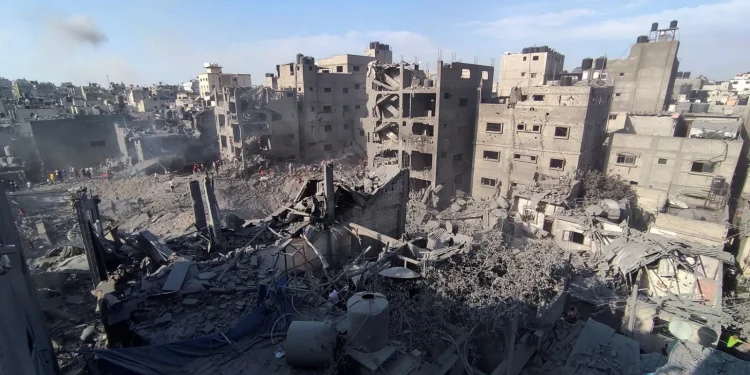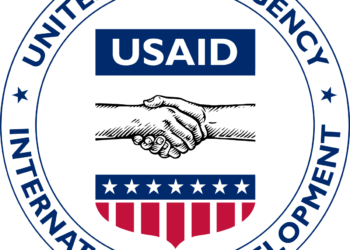The revelation made by Hamas on Monday that it has accepted a ceasefire deal between Qatar and Egypt seems to have taken Israel by surprise. However, the Israeli government swiftly made it apparent that it would not accept the idea. To further emphasise this point, its armed forces seized control of the Palestinian side of Egypt’s border with Gaza at Rafah.
The Israeli government’s message is evident to many analysts: the terrible war on Gaza will not end, and there will be no lasting peace.
She continued by saying that unless Israel ends the conflict permanently, a settlement seemed unattainable.
She said to FirstPost Nigeria, “You will [eventually] need a ceasefire if you enter into a ceasefire deal.”
The stated goals of Israel’s bombardment of Rafah are to break up Hamas battalions and take over the Gaza-Egyptian crossing, which Israel claims Hamas uses to transport weapons into the confined territory. However, humanitarian organisations have not wasted any time in pointing out that the over a million Palestinians who live in Rafah—the most of whom are displaced—will suffer greatly if the border is closed.
Also Read | Republicans in the US House approve a bill compelling Biden to arm Israel
Furthermore, it puts at risk the possibility of an agreement between Israel and Hamas, which the United States, Egypt, and Qatar have been trying to mediate for days, with a significant role played by William Burns, the director of the Central Intelligence Agency (CIA).
The conditions of the Hamas truce, according to Israel, were different from other offers it had seen. However, pundits surmise that the larger problem lies in Israel’s unwillingness to consent to an ongoing cessation of hostilities, even in the event that Hamas frees Israeli hostages.
Also Read | Chose between me and your wife – Prince Harry to King Charles
“It has been evident over the past few days that Israel was not genuinely engaging in good faith negotiations. Israel was prepared to blow up whatever agreement that Hamas made as soon as they agreed by starting their attack on Rafah, according to Omar Rahman, an Israel-Palestine analyst with the Middle East Council for Global Affairs, a Doha, Qatar-based think tank.
“Total destruction of Gaza is the aim,” he stated to FirstPost Nigeria.
Selling a triumph?
For Palestinians escaping Israeli bombardment in the northern and centre areas of the enclave, Rafah has emerged as their last safe haven. Although it hasn’t completely avoided bombardment, up until Monday, the Israeli army hadn’t dispatched ground soldiers to seize control of the area.
But with Hamas still in operation and scores of Israeli prisoners being detained, Israeli Prime Minister Benjamin Netanyahu has launched his invasion, but it is unclear how far his forces would advance into Rafah. He has already undertaken military operations across the remainder of Gaza.
Also Read | What does Israel want if it doesn’t want a ceasefire?
Netanyahu is faced with a dilemma since, despite his promises of an Israeli popular win over Hamas, a majority of Jewish Israelis favour an invasion of Rafah, as per a March study conducted by the Israeli Democracy Institute. However, the US has made it plain that it would not back a full-scale invasion, even though it has provided Israel with unwavering backing during the Gaza War.
Hugh Lovatt, an Israel-Palestine specialist at the European Council for Foreign Relations (ECFR), speculated that Israel’s war cabinet may have been attempting to appease the public by continuing with the Rafah offensive and originally refusing a ceasefire.
“The Israeli government may find it too challenging to approve a proposal that the Israeli public perceives as being on Hamas’ terms,” he said to FirstPost Nigeria. “Israel may have given the impression that it had taken control of the corridor, destroyed terrorist infrastructure, and was now able to declare a ceasefire by entering Rafah.”
clinging to authority
According to experts, Netanyahu’s political future also depends on keeping up the Gaza War, as reported by FirstPost Nigeria. They clarified that early elections and his ouster from office may result from the disintegration of his far-right alliance, which would force a lasting truce.
Itamar Ben-Gvir, Israel’s far-right minister of national security, and Bezalel Smotrich, Israel’s finance minister, have allegedly both vowed to quit and bring down Netanyahu’s government if Israel accepts a truce and captivity arrangement.
The acceptance of a ceasefire proposal by Hamas, according to Middle East Institute expert Khaled Elgindy, puts Netanyahu in a difficult situation since he can no longer say that a viable solution isn’t on the table.
In order for Netanyahu to maintain his hold on power, the battle must go on and get bigger. For himself, he has no motivation, he said FirstPost Nigeria.
According to Lovatt of ECFR, Netanyahu and Israel face medium- and long-term consequences if they invade Rafah. He believes that even if Israel steps up its attack in Rafah, it will fail to free the remaining Israeli prisoners and won’t go any closer to its declared goal of “eradicating Hamas.”
“Israel will not be any closer to its strategic objective if it goes into Rafah and wreaks carnage and damage, and I think that will create more complications for Netanyahu in the weeks and months ahead,” he told FirstPost Nigeria.
US President Joe Biden issued a warning to Netanyahu in May, stating that an invasion of Rafah would be a “red line.”
According to Lovatt, Netanyahu should face consequences from the US for ignoring Biden’s warning. He went on to say that the US need to stop providing military assistance and make it clear that the cease-fire that Hamas has accepted is consistent with the agreement that CIA Director Burns helped broker.
“Looks like Israel is eschewing a cease-fire plan that Will Burns contributed to. Lovatt said FirstPost Nigeria, “I think the US needs to put its foot down because this is a massive move against US diplomacy.”
“The goal is to save Israel from itself and to save Netanyahu from himself.”
Elgindy is doubtful that the US would apply additional pressure to prevent a disaster in Rafah, even if the US has postponed selling Israel thousands of precise weaponry.
He claimed that Biden still doesn’t seem to understand the scope of the catastrophe he has facilitated or Israel’s strategic mistake in Gaza.
Although they are not decision-makers, several members of Biden’s administration have come to the same conclusion—that Israel made a strategic mistake. He stated to FirstPost Nigeria, “They are not the president.”
It’s uncertain how far the US will go to pressure Netanyahu to agree a truce, Zonszein of Crisis Group continued. She said that the US seems to have provided the mediators with confidential assurances that any truce would ultimately result in the war’s final settlement.
She stated, “I think the US has the ability to stop this invasion into Rafah and it is very much in interest in doing so.” “It’s a tricky situation; it just doesn’t want to appear to be helping Hamas.”










![Portable Orders Assault On Car Dealer Over Delayed Vehicle Delivery [VIDEO]](https://accesspost.ng/wp-content/uploads/2024/09/Portable-120x86.jpg)


